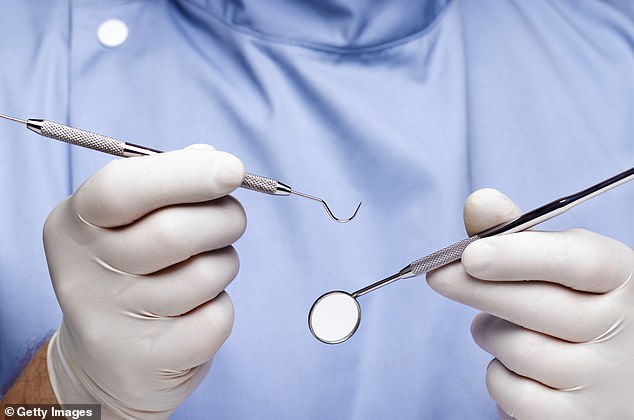Civil servant Saira Malik had been attending the same NHS dental practice for nearly a decade and believed her teeth were in safe hands – until a catastrophic mistake almost ended her life.
The 53-year-old first began visiting the clinic, in Surbiton, south-west London, in 2009.
But it wasn’t until 2016 that Saira began to experience problems. She developed toothache on the upper right side of her mouth which was so bad it disrupted her work and sleep.
Concerned it might be tooth decay, she made an appointment with her dentist.
Tooth decay, caused by a build-up of plaque, is one of the most common dental conditions, with an estimated third of adults suffering some signs of the problem. Caught early, it is easily fixed by deep cleaning and teaching patients brushing techniques.
However, left untreated, it can lead to swollen gums, tooth loss and abscesses – pockets of puss in which bacteria congregates that can trigger serious – sometimes life-threatening – infections.
But Saira says she was told by her dentist – on repeated occasions – there was no tooth decay.
‘I was told on multiple visits that no decay was present,’ says Saira.

Civil servant Saira Malik had been attending the same NHS dental practice for nearly a decade and believed her teeth were in safe hands – until a catastrophic mistake almost ended her life

Tooth decay, caused by a build-up of plaque, is one of the most common dental conditions, with an estimated third of adults suffering some signs of the problem. Caught early, it is easily fixed by deep cleaning and teaching patients brushing techniques
However, she would later find out that her dentist had missed the signs of tooth decay. It would prove a costly – and agonisingly painful – mistake for her.
Saira is not alone. In recent years, thousands of patients have suffered negligent treatment at the hands of their dentists. Data from NHS Resolution – the legal arm of the Health Service – shows a 50 per cent rise in payouts due to mistakes during dental procedures in the past five years, totalling £11 million.
However, these figures only include cases that occurred in NHS hospitals, where the most severe or emergency procedures take place. The vast majority of dental care is in local practices.
And according to data collected by British law firms, the number of recorded cases of misdiagnoses across the country has doubled in the past five years. Meanwhile the number of surgeries which have gone wrong – resulting in medical negligence legal claims – have risen by a third year-on-year since 2020.
Experts blame this worrying trend on stretched NHS dentists, who are taking on more work due to a nationwide shortage. The number of NHS dentists in England is now at its lowest in a decade, at about 23,000. This is down nearly 1,100 from pre-pandemic numbers. About 95 per cent of practices are not accepting new NHS patients.
In 2018, Saira returned to her dental practice once again – but this time the verdict on her sore tooth was far different.
‘They said it was severely decayed and couldn’t be saved,’ she says. ‘They referred me to get it extracted without any other options given.’
The surgery took in March 2019, at a different practice.
‘It was a very painful treatment,’ says Saira. ‘And it really put me off having dental surgery again.’
But just a few months later, part of a tooth on the left side of her mouth broke off. Returning to her dental practice, she was given even more bad news: the entire tooth would have to be removed. Once again, severe decay was the cause.
‘I was so nervous about it after my previous surgery experience,’ she says. ‘But I didn’t have a choice.’
However, the op took a terrifying turn – as the tooth was taken out
it also ripped out a chunk of bone, rupturing a blood vessel.
‘The next thing I knew, buckets of blood were pouring out of my mouth and nose,’ says Saira. ‘I don’t remember anything that happened next as I passed out. When I woke up I was in intensive care in hospital.’
The bleeding had been so serious that when Saira arrived at hospital in an ambulance she had to be intubated – a pipe was inserted into her windpipe to help her breathe. She spent six days in hospital recovering. And now, Saira says, even several years on the experience still haunts her – and believes it could have been avoided if her dentists had spotted her tooth decay.
‘The experience was traumatic,’ she says. ‘If they’d treated my teeth earlier, I wouldn’t have had to go through all this. I’ve not been back to a dentist since as I’m too scared.’
Experts are concerned at the growing number of British patients harmed during routine dental procedures – as well as the number of common maladies, such as tooth decay, which are being missed.
And while all agree it is crucial that the NHS hires more dentists, some argue that many clinicians are getting away with mistakes because there is no legal requirement for them to record the number of misdiagnoses and botched procedures that occur in their practice.
Dr Abhi Pal, a dentist who acts as an independent expert in medical negligence cases and runs a number of practices across the country, says: ‘There has definitely been a rise in complaints and litigation in recent years.
‘The errors are unfortunate, and still rare. However, dentistry still lags behind in having a structured reporting system for this.’
So why are botched dental procedures on the rise – and what can patients do if it happens to them?
Experts say the shortage of dentists is due to a long-running dispute with the Government over the amount they earn from carrying out procedures.
For every NHS patient that dentists see, the Health Service will reimburse them an agreed amount.
However, a growing number of dentists argue they are not being paid enough to carry out NHS work and are instead choosing to focus on private patients.
In 2023, the parliamentary Health Select Committee published a hard-hitting report that concluded the state of NHS dentistry was ‘totally unacceptable in the 21st Century’ which was resulting in a ‘decline in oral health’ across the country.
It highlighted cases where patients, unable to see a dentist, had instead use pliers to remove their own rotten teeth.
Last year the Conservative government announced a plan to fix the dentistry crisis, which included a ‘golden hello’ bonus payment of £20,000 for those who agreed to take on NHS work in areas with severe shortages.
But latest data shows little-to-no change in the number of dentists working for the Health Service. Earlier this year MPs on the Public Accounts Committee branded the plan a ‘complete failure’.
All told, experts say the shortage of NHS dentists is putting extreme pressure on those who remain.
‘The issue is that with this strain on services, even patients at previously reliable NHS practices are facing severe delays,’ says Dr Jeffrey Sherer, co-founder of The Dental Design Studio, who offers NHS services.
‘When a problem is spotted at a check-up, work to correct it should be booked immediately, however demand means that sometimes patients are having to wait months.
‘The reality of that is the longer someone has to wait, the more drastic the treatment becomes.
‘As the issue gets worse, more complex procedures are required, where there is more chance of serious mistakes occurring.
‘This is part of the reason we are seeing this rise in medical negligence cases. What could have initially been treated with preventative work often then has to be treated with the tooth being removed, as the patient has had to wait so long there has been further deterioration of the teeth.’

Some argue that many clinicians are getting away with mistakes because there is no legal requirement for them to record the number of misdiagnoses and botched procedures that occur in their practice
One medical negligence firm, the Dental Law Partnership, in Cheshire, says that they have seen a sharp rise in cases. According to its database, the parts of the country most affected include Lincolnshire, Peterborough and Cornwall. Previous research has identified all three as ‘dental deserts’ – meaning there are few or even no NHS dentists accepting new patients.
‘We have seen a huge rise in cases over recent years,’ says Chris Dean, a former dentist and now a solicitor at the Dental Law Partnership. ‘That is not because the nation’s teeth are getting worse, but there is huge pressure on dentists, with growing waiting lists and a lack of staff.
‘It really is a perfect storm for procedures to go wrong and for underlying conditions not to be spotted, and patients need to know what to look out for.’
Mr Dean, who worked as an NHS dentist for more than two decades, says that he has seen a worrying number of patients who have had their teeth needlessly removed, often when a simple procedure – known as a root canal – could have saved them.
However, he adds that one of the most commonly seen claims relates to missed diagnoses of gum disease – which affects nearly one in five British adults.
Experts say the first signs of gum disease are usually bleeding gums, bad mouth odour and loose teeth. It is easily treated when spotted early. However, left untreated, it can lead to tooth loss, infections and severe pain.
Growing research suggests that untreated gum disease also raises the risk of life-threatening chronic conditions such as heart disease, stroke and diabetes.
‘The amount of patients who contact us with serious complications of gum disease is really worrying,’ says Mr Dean. ‘It’s a really simple thing to spot.
‘One of the main pieces of advice I give to patients is this: if you regularly attend the dentist, there is no reason you should be experiencing pain in your mouth.
‘If this happens to you, it’s possible that your dentist has missed something.
‘Other problems to look out for are chronic sinus issues, a foul taste in your mouth, persistent runny nose, head pain or pus in your throat.
‘Such symptoms might arise from errors during extractions, root canal procedures, or implant placements that impact surrounding structures or nerves, causing long-term discomfort and complications. If you are experiencing any of these problems, it might be worth speaking to a medical negligence lawyer.’
According to the Dental Law Partnership, the average payout for a misdiagnosis is around £13,000, while injuries sustained due to missed gum disease can lead to payments of up to £25,000.
Last year, Saira was paid £8,500 in an out-of-court settlement. The dental practice owners involved did not admit liability.
However, dentists add that while it is important to know the signs of negligence, it is far more crucial to know how to keep teeth healthy in the first place.
‘It is difficult for patients at the moment, with the lack of dentists across the country,’ says Dr Sherer. ‘But equally, most problems can be prevented by taking care of your teeth. Everyone should be brushing twice a day for two minutes, flossing daily, and limiting the amount of sugar they consume.
‘It’s also important to make yearly appointments to see the dentist, who can carry out scans and tests to look for severe tooth issues, but also the hygienist, who can clean the teeth to prevent gum disease and decay.
‘Yes, many people can’t get in to see their NHS dentist, and going private can be expensive, but a regular appointment will be far cheaper than waiting until complicated surgery is the only option.’













